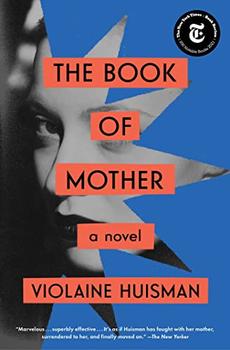Summary | Excerpt | Reviews | Beyond the book | Read-Alikes | Genres & Themes | Author Bio

A Novel
by Violaine HuismanFictionalizing the life of author Violaine Huisman's own mother, this debut novel is split into three distinct sections. The first is arguably the strongest, opening with matriarch Catherine's hospitalization following a nervous breakdown. Narrated from the perspective of her youngest daughter (a representation of Huisman herself), we see a series of anecdotal snapshots detailing Catherine's erratic behavior throughout her daughters' childhood and her gradual descent into the grips of bipolar depression, alcoholism and drug addiction. The non-linear timeline in this section reflects the meandering nature of memory, as Catherine's daughter paints a portrait of a mother as enigmatic and passionate as she is chaotic and careless.
The second section takes us back to Catherine's own childhood, walking us through the chronology of her life up to the point of her breakdown. Though the gut-punch of the book's focus on a complex mother-daughter dynamic takes something of a backseat here, it does poignantly add context for Catherine's fractured mental state, a succession of betrayals and losses – particularly at the hands of men – gradually wearing her down. In the third and final section, the book jumps to Catherine's later years. Here, her daughters attempt to make peace with the repercussions of their mother's turbulent identity and lifestyle; to reconcile the strange mix of love, reverence and resentment they hold for the woman who shaped so many aspects of their lives.
Huisman's prose is very strong, her poetic flair remaining intact thanks to Leslie Camhi's skillful translation from the original French. It feels befitting of the subject's captivating aura, the author clearly eager to pay tribute to Catherine's charms despite the brutally honest portrayal of her flaws. Indeed, Huisman is candid about the reality of her mother's self-destructive substance abuse, and her propensity for physically and emotionally damaging behavior during her deepest bouts of depression.
Though the relationship between Catherine and her daughters is undeniably toxic at times, it becomes clear that amidst all the chaos of their lives, they remain each other's one constant. With their love serving as a vital anchor, their mutual reliance on one another's presence despite the ways they hurt each other takes on new significance.
One of the book's other greatest strengths is its subtle yet powerful look at the idea of inheritance, and the fight to break cycles that repeat themselves across generations. Despite the upsetting subject matter, there are unexpected moments of comedy woven throughout. This does well to add some levity and to comment on the often vital role humor can play in helping us navigate life's darkest moments. Our narrator – and by extension, Huisman herself – displays an admirable if hard-won resilience.
At once a purge of years' worth of pain and a celebration of a life lived at the extremes, Huisman's blend of fact and fiction feels like the ideal narrative style to immortalize a woman whose bittersweet story consistently blurred the lines between sorrow and joy, heartache and passion, savagery and love.
![]() This review was originally published in The BookBrowse Review in November 2021, and has been updated for the
November 2022 edition.
Click here to go to this issue.
This review was originally published in The BookBrowse Review in November 2021, and has been updated for the
November 2022 edition.
Click here to go to this issue.

If you liked The Book of Mother, try these:

by Edouard Louis
Published 2025
An autobiographical novel from Édouard Louis, hailed as one of the most important voices of his generation—about social class, transformation, and the perils of leaving the past behind.

by Andre Aciman
Published 2024
The author of Call Me by Your Name returns with a deeply romantic memoir of his time in Rome while on the cusp of adulthood.
The single biggest problem in communication is the illusion that it has taken place
Click Here to find out who said this, as well as discovering other famous literary quotes!
Your guide toexceptional books
BookBrowse seeks out and recommends the best in contemporary fiction and nonfiction—books that not only engage and entertain but also deepen our understanding of ourselves and the world around us.